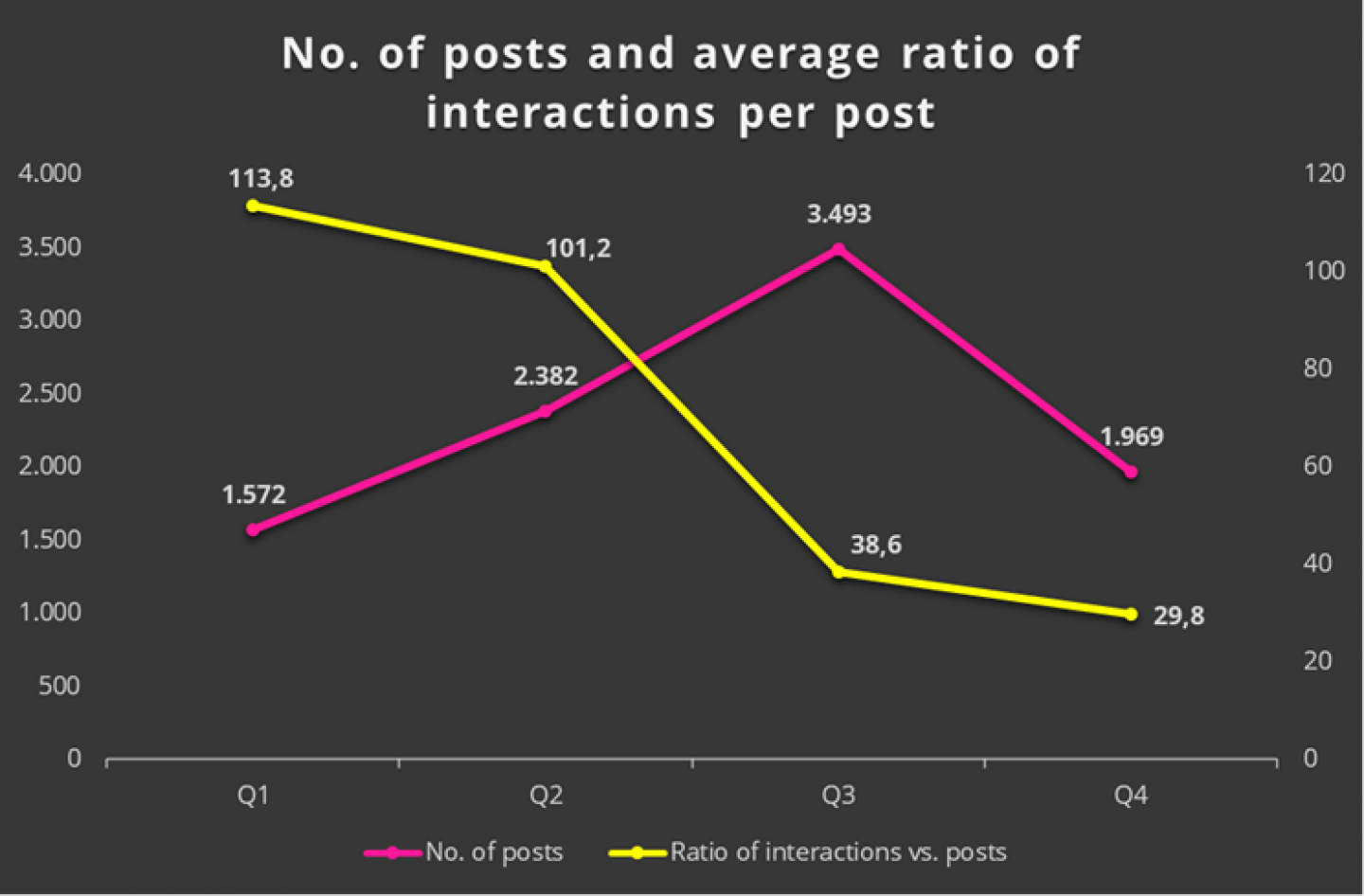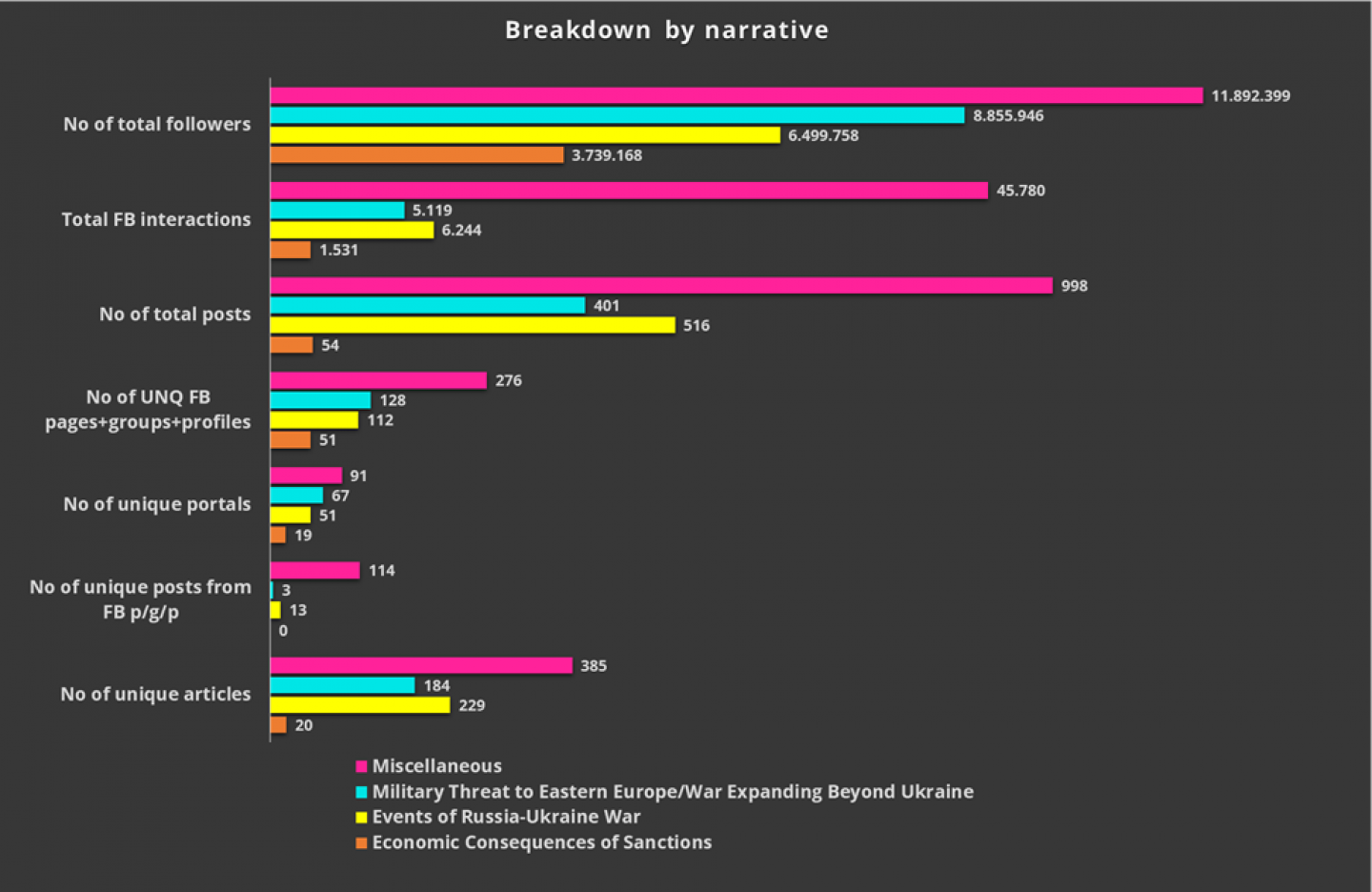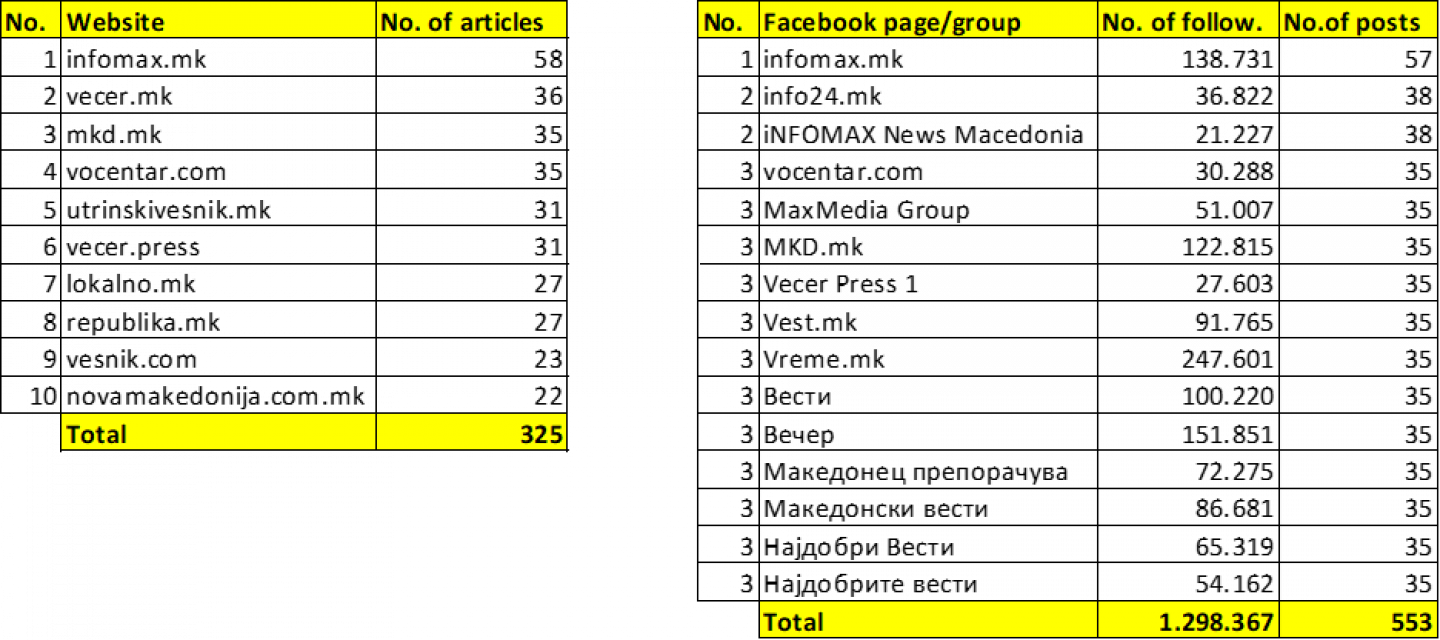Introduction and summary
This report analyses the major Russian propaganda, influence and disinformation narratives present in the online space in North Macedonia in the period January-March 2023.
A total of 818 articles and 130 unique Facebook posts (non-article related/content creation) were recorded and analyzed within this monitoring period. The articles were published by 102 websites and on Facebook, shared and amplified through 1.969 posts on 299 Facebook pages/groups, with a potential reach of 13.045.041 followers, and triggering a total of 58.674 interactions on Facebook.
A comparison with the previous reports shows that with the exception of the number of articles and Facebook posts, all the other categories have the lowest values from all quarters. Especially staggering is the drop in the number of interactions – approximately twice lower than Q3 and four times lower than Q2 – which can be attributed to the lower number of interactions in general, as well as the lower number of interactions on the posts with articles by think.mk. In addition, this portal has been suspended since the beginning of March.

The average ratio of interactions per post has been constantly decreasing – 113,8 in Q1 (April-June), 101,2 in Q2 (July-Aug), significantly decreasing in Q3 (Oct-Dec) to 38,6 interactions per post, ending with 29,8 in Q4 (Jan-March). After the steady increase until Q3, the number of posts has dropped in Q4 to 1.969.

The narratives related to the Russian invasion on Ukraine were grouped under four general topics: (1) Events of Russia-Ukraine War (2) Economic Consequences of Sanctions, (3) Threats by Russia, and (4) Miscellaneous. Due to overlapping nature of the narratives within the topics, and tracking the regional context aside of the Ukraine war, an additional chapter was added elaborating the narratives with regional context.

In this report the trend from the previous report in regards to the presence of the topics continued, and now the topic Miscellaneous was dominant across all of the categories.
Within this report, the narratives were portraying picture that The West forced Russia to attack Ukraine, with an increased presence of Chinese narratives related to the Russian aggression on Ukraine. Hungary continued to oppose the sanctions against Russia, while the latter continued its nuclear threats, as well as its threats towards Moldova.
Officials from totalitarian and authoritarian regimes and those that nurture illiberal values promoted anti-US and anti-EU narratives, while Russian and Chinese officials promoted the narrative Multipolar world. The narrative Slavic and Orthodox brotherhood was the most prevalent and most engaged with within the entire period, continuing the trend that was observed in the previous months in which the activities of the so-called Russian diplomacy were focused on the Orthodoxy and other religious issues.
Within the narratives with regional context, tensions in the Kosovo-Serbia relations continued to be high on the event agenda and a pretext for various statements that promoted Russian narratives and incited dismay across the multi-ethnic region, as well as promoting the narrative Kosovo is Serbia. Serbian and Russian friendship was promoted as well, while the anniversary of the 1999 NATO intervention in Yugoslavia was used as a pretext to promote the anti-NATO narrative NATO uses radioactive ammunition.
Events related to the Russian invasion of Ukraine
A total of 229 articles or Facebook posts were analysed. The articles were published by 51 websites and on Facebook, shared and amplified through 516 posts on 112 Facebook pages/groups, reaching 6.499.758 followers and triggering a total of 6.244 interactions on Facebook.
Within this topic, there are two main narratives that were the most dominant for the period: (1) The West forced Russia to attack Ukraine and (2) Chinese narratives related to the Russian aggression on Ukraine.
Although the narrative The West forced Russia to attack Ukraine was present only during the first two weeks of February, it still had the highest number of interactions within this topic. It was promoted through a statement by Croatian President Milanović that Russia had been provoked in the period 2014-2022 in order to incite the current war. He added that if Russia were defeated in a conventional war, that would mean the beginning of a nuclear one. He concluded that what the West was doing to Russia was “deeply immoral”. The irony is in the fact that the statement was given on the occasion of sending Croatian troops to reinforce NATO presence in Lithuania, exactly as a response to the Russian aggression over Ukraine.
The Chinese narratives related to the Russian aggression on Ukraine were also present in February and were the most prevalent in regards to the number of posts. This was due to the fact that the information space in North Macedonia was flooded with articles about the diplomatic activities of Chinese officials related to the Russian aggression of Ukraine. The common denominator of all these activities is that they were all conducted in, or with officials from authoritarian countries (Russia and Belarus), as well as from Hungary, which opposes EU policies towards Russia. The other element is the hypocrisy of the Chinese. They spoke about respect of international law, respect of the sovereignty of all countries and non-aggression towards third countries – principles that are violated precisely by the unjustified Russian aggression on Ukraine, which was never condemned by China.
Economic consequences of sanctions
A total of 20 articles or Facebook posts were analysed. The articles were published by 19 websites and on Facebook, shared and amplified through 54 posts on 51 Facebook pages/groups, reaching 3.739.168 followers and triggering a total of 1.531 interactions on Facebook.
This was the least engaged with topic within this period. There was only one narrative, Hungary does not support the sanctions against Russia, which had been present in the second half of January. The narrative was promoted through a statement by Hungarian PM Orbán that Hungary will veto EU sanctions on Russian nuclear energy. Ukraine has called on the EU to include the Russian state nuclear company Rosatom in the list of sanctioned Russian companies, but Hungary, which already has one Russian-made nuclear power plant and plans to expand it, blocked that proposal. This continued the trend of Orbán being one of the most vocal spokesman of the Kremlin when it comes to the sanctions against Russia. He is also one of the most influential voices in the region since he owns several media groups in the countries across the Western Balkans.
Military Threats by Russia
A total of 184 articles or Facebook posts were analysed. The articles were published by 67 websites and on Facebook, shared and amplified through 401 posts on 128 Facebook pages/groups, reaching 8.855.946 followers and triggering a total of 5.119 interactions on Facebook.
Within this narrative there were nuclear threats and threats towards Moldova issued by Russia. The nuclear threats was the most prevalent and the most engaged with narrative and it was present in January and February. It was promoted by several Russian officials and figures, as well as Russian allies. Chechen leader Kadyrov gave end-of-the-world and holy-war statements, while Russian Patriarch Kirill stated that any desire to destroy Russia would mean the end of the world, contributing at large to the prevalence and amplification of this topic. Another occasion for issuing nuclear threats presented itself with the suspension of Russia’s participation in the bilateral New START treaty on nuclear arms control, which contradicted their alleged willingness for de-escalation of the conflict.
Threats towards Moldova was the second most prevalent and most engaged with narrative, and it was present in February and March. Russian FM Lavrov, said that Moldova could play the role of the "next Ukraine", while the issue of Transnistra, a region bordering Ukraine and temporary occupied by Russia, was the pretext for almost all the other statements. Kremlin spokesman Peskov threatened the authorities of Moldova to be “very, very careful” about the issue of Transnistria, while Russian President Putin rescinded a 2012 decree that partially upheld Moldova's sovereignty in deciding the future of Transnistria. Russian Ministry of Foreign Affairs stated that an attack on the Russian forces in Transnistria will be treated as an attack on Russia. Russia has kept about 1,500 troops since the Moscow-backed region unilaterally declared independence during a 1992 civil war.
Slavic and Orthodox brotherhood
The narrative Slavic and Orthodox brotherhood was the most prevalent and most engaged with during the entire period, and was present in January and February. In January, the New Year and Christmas holidays were misused to celebrate Russian or Serbian saints or religious figures by pro-Russian voices. Russian propaganda was spread by an official from the pro-Russian political party Rodina. However, the most influential case with 15K interactions (roughly 25% of the total number of interactions for the entire period) was the visit of Russian Metropolitan Antony of North Macedonia, which was used for conducting an information and influence operation. The timing of the visit (New Year and Christmas holidays) and the presence of high-level representatives of the Russian Orthodox Church was not a coincidence, but a well-planned and organized operation, since during this time of the year people are focused on religious holidays. The visit of Antony was marked by a number of events, thus creating the opportunity for extensive and lengthy coverage. There has been a well-coordinated promotion and mass dissemination of news, with a high level of activity and amplification by pro-Russian Facebook infrastructure.
In February, Russian Embassy in Skopje celebrated of the Day of the Russian Diplomacy with an event which was held in front of the monument “Russian Cross” in Bitola, accompanied by a memorial service by clergy from the Macedonian Orthodox Church. This continued the trend that was observed in the previous months in which the activities of the so-called Russian diplomacy were focused on the Orthodoxy and other religious issues. Russian Ambassador in North Macedonia gave an interview in which he spoke about the supposed centuries-old friendly ties with the people of North Macedonia, therefore promoting this longstanding Russian narrative.
Anti-US narrative
Anti-US narrative was recorded in the first two weeks of March. It was promoted by officials from totalitarian and authoritarian regimes. Chinese MFA spokesperson Wang Wenbin said that the real cause of concern was the US' destructive role in world peace and stability, while the Deputy Director of the Public Information Department of the Workers' Party of DPR Korea Kim Yo Jong blamed the US for fueling the world crisis by providing Ukraine with military aid, therefore expressing its opposition to the support provided to Ukraine. Finally, Chinese FM Qin Gang said that the US’ actions related to the war could have "catastrophic consequences". Aside of these claims and messages, Hungarian PM Orbán launched an initiative for the European allies to form their own military bloc similar to NATO without the US. It seems that he was joined by other officials of totalitarian and authoritarian countries, such as DPR Korea and China, which gave more visibility and ensured wider spread of the Russian narratives.
Multipolar world
The narrative Multipolar world was the most prevalent according to the number of Facebook posts within the entire monitoring period and it was promoted in January and March. In January Deputy Chairman of Russian Security Council Medvedev speculated about a new military alliance that would “restore the balance in the world”. This was accompanied by an anti-NATO narrative promoted through an article by Chinese paper Global Times, concluding that the West could not avoid or ignore the multipolar world. Global Times has been frequently cited in the Macedonian online space and sometimes misrepresented as a Western credible source.
The visit of President Xi Jinping to Russia in March was used to promote the Russian narratives Russia respects international law and Russia and its allies are strong. It is a fact that Russia actually breached the UN Charter by attacking Ukraine, so to say that it was “protecting the world order based on international law and the basic norms of international relations based on the goals and principles of the UN Charter” is a hypocrisy. Credible reports also show that Russian economy shows negative developments with declining trade and soaring inflation. Surprisingly, the focus of the coverage of the visit was put on Xi Jinping, since there were almost no transmitted statements by Putin from the meeting.
Narratives with regional context
The tensions in the Kosovo-Serbia relations continued to be high on the event agenda and a pretext for various statements that promoted Russian narratives and incited dismay across the multi-ethnic region. In January, President of Republika Srpska Milorad Dodik praised Serbian President Vučić for “managing to bring the issue of Kosovo from a losing position back on the agenda and in the focus of interest”. He also said that the community of Serbian municipalities would one day turn into a Republika Srpska on Kosovo, meaning that it would have similar position as Republika Srpska has in the political system of BiH.
The narrative Kosovo is Serbia was present as well in February. Croatian President Milanović gave a statement saying that Kosovo was annexed and taken from Serbia and compared this case with the annexation of Crimea, saying that Crimea will never be Ukrainian again. Since the beginning of the war, Russian officials promoted the narratives Crimea is Russian and Donbas equals Kosovo and Milanović's statment is fully in line with these narratives. Expectedly, Serbian Foreign Minister Dačić welcomed Milanović’s statement.
The Statehood Day of Serbia and the anniversary of establishing diplomatic relations between Russia and Serbia in March were the pretext for conducting an information operation that promoted Serbia’s opposition to introducing sanctions against Russia, as well as Russia’s “understanding” that Serbia was under heavy pressure to introduce sanctions against the former.
Finally, the narrative NATO uses radioactive ammunition was promoted through the reactions of Russian officials and allies that UK would supply Ukraine with ammunition with depleted uranium, bringing it also in relation with the 1999 NATO intervention in Yugoslavia. The narrative about the depleted uranium and radioactivity is longstanding in the Balkans, and has been continuously used in disinformation campaigns aiming to discredit NATO.
Statistics
Top 5 stories by number of articles, reach and interactions

Top 10 websites by number of articles and top 10 Facebook pages/groups by number of posts (articles)

The top 10 websites according to the number of articles or 9,8% of the total number of websites, published 39,7% of the total number of articles (325 out of 818 articles).
The top 15 Facebook pages/groups according to the number of posts or 5% of the total number of Facebook pages/groups) posted 28,1% of the total number of posts [553 out of 1.969 posts (articles)].



